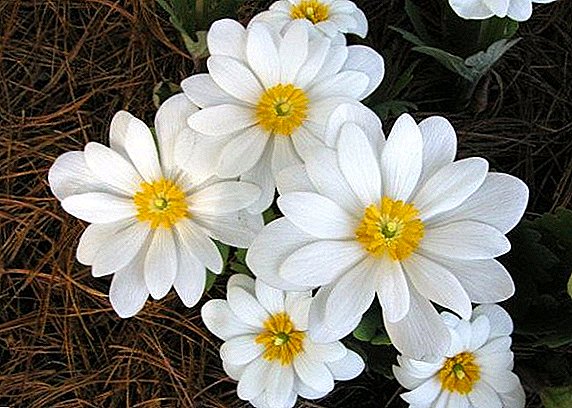 Canadian Sanguinaria - perennial, widespread in the forests of North America. Attractive by its white flowering, the plant is actually poisonous, but at the same time its root, which is called bloody, has healing properties.
Canadian Sanguinaria - perennial, widespread in the forests of North America. Attractive by its white flowering, the plant is actually poisonous, but at the same time its root, which is called bloody, has healing properties.
Chemical composition
Canadian sanguinarium rhizomes (Sanguinaria canadensis) have a high concentration of toxic alkaloids (chelidanic acid, chelerythrine, sanguinarine toxin, and tannins), which affect the human body in different ways: they can excite the nervous system, reduce the sensitivity of nerve endings, inhibit work cardiovascular system and have an analgesic effect.
Learn about the beneficial properties and contraindications of Hypericum, burdock root, eucalyptus, meadow cornflower, hibiscus, mountain arnica, bison, red onion, red elderberry, Tibetan raspberry, parsnip, Indian dusheni, dandelion, edible cassava.
 The remaining components are not important from the point of view of medicine. It is called the homeopathic remedy, made from the sap of the plant root.
The remaining components are not important from the point of view of medicine. It is called the homeopathic remedy, made from the sap of the plant root.
Did you know? The properties of the Canadian sanguinaria were first proposed as medicinal by George Henry Butt, a representative of early homeopathy.
Medicinal properties
The sap of the root of a plant is a component of many medicines. Most often it is a component of many cough preparations and oral care products. In folk medicine, it is used as a tonic, abortive, analgesic, emetic, and also used in the treatment of pneumonia and other respiratory diseases.
Also considered a good bactericidal agent and suitable for disinfection wounds and ulcers; treating rashes and acne. Sanguinaria is one of the few means to help relieve headaches of migraine nature, and can also improve the general condition of a woman during menopause.
Important! Can be used as an insect repellent.

Use in medicine and homeopathy
In homeopathy, Sanguinaria canadensis serves as a spasm remover, astringent, expectorant, antibacterial agent. Also indications for use are chronic joint diseases, bronchial asthma, various types of migraine. Included in the composition of many drugs that treat female reproductive function, and is used in menopausal disorders.
Homeopathic remedies containing sanguinar root juice are also used for vegetative instability, congestive cephalgia, neuralgia, shell hypertrophy, laryngitis, bronchial and chronic nasopharyngeal catarrh, rhinitis, excessive sweating, acne, spastic urination.
For the treatment of diseases of the oral cavity is also used sage meadow, uvulyaria, maple, Manchurian walnut, yarrow, grass dope, marjoram, princess, lime, heather, rose, kalanchoe, cactus.
Commercial use
Sanguinaride, an alkaloid found in the root of a plant, is used. in the production of oral hygiene products. Sanguinaria is approved as a component of many toothpastes, as it has antibacterial properties. Also for the prevention of tartar used various kinds of tincture. For the treatment of gingivitis, rinsing preparations are marketed based on this extract.

Important! 0.5 grams of sanguinar root powder is considered an active poison.
Harvesting and storage of therapeutic raw materials
As a raw material for therapeutic and prophylactic drugs, both the ground part of the plant and its root are used. Portions of sanguinarians dry or extract juice from them. The root can be used in any form. In the process of preparation, the main thing is to protect the hands: the plant has an irritant effect, the main symptom of which is burning.
Did you know? The blood root got its name due to the orange-red juice obtained from it.
Contraindications and harm
Like any homeopathic drug, Canadian sanguinaria used in very low concentrationsbut, despite its medicinal properties, sanguinaria has a number of contraindications. Sanguinaria is contraindicated in pregnant women, children, people with individual intolerance to the extract. Without expert advice, the use of the drug can be harmful, and the wrong dosage, unfortunately, leads to fatal.

The use of any homeopathic remedies should be treated with caution. Incorrect dosage makes the drug poison, and in the case of sanguinaria, it is pure poison. Therefore, if it is necessary to treat in this way, you should contact a specialist for consultation and individual appointments.












